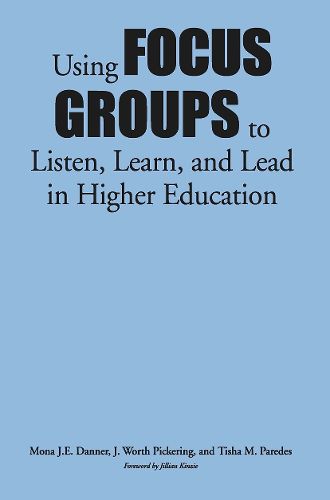Readings Newsletter
Become a Readings Member to make your shopping experience even easier.
Sign in or sign up for free!
You’re not far away from qualifying for FREE standard shipping within Australia
You’ve qualified for FREE standard shipping within Australia
The cart is loading…






Using Focus Groups to Listen, Learn, and Lead in Higher Education presents an easy-to-use 6-step guide to help leaders in higher education listen to and learn from their stakeholders in order to enhance decision making. The big questions facing institutions today, especially those surrounding access, affordability, and accountability, require more than dashboards. Metrics and quantitative data alone do not offer lasting solutions and improvements. Using qualitative methods to listen to the voices of those involved, especially students and staff, is critical. Focus groups constitute the most appropriate, rigorous, and relevant qualitative research tool for this purpose, and one that is cost-effective and builds community when conducted using the ODU Method described in this book.
Using Focus Groups is a single, comprehensive, and practical resource that describes why, when, and how to use focus groups. The authors provide detailed guidance for using focus groups, from developing the research questions with stakeholders, through training and recruiting moderators, and identifying and recruiting participants, to the logistics of conducting focus groups, and ultimately analyzing data and developing final reports. Conversational vignettes illustrate the discussions that regularly occur in each step and help the reader better understand the process. Fifteen appendices provide templates and examples of every part of the process.
Written particularly for institutional research and assessment staff and upper-level administrators, this book will also appeal to deans, department and program chairs and directors, faculty leaders, and administrative unit directors, including those in auxiliary and student services, alumni associations, and university foundations. It also serves as an excellent resource for higher education research methods courses.
The authors are uniquely positioned to guide readers in this process. The team developed and refined this technique over two decades at Old Dominion University. They have conducted over 100 focus groups with campus, nonprofit, local, and international community organizations to assist them in assessing student learning, transition, and preparedness for the workforce, as well as evaluating organizations work and planning future projects.
$9.00 standard shipping within Australia
FREE standard shipping within Australia for orders over $100.00
Express & International shipping calculated at checkout
Using Focus Groups to Listen, Learn, and Lead in Higher Education presents an easy-to-use 6-step guide to help leaders in higher education listen to and learn from their stakeholders in order to enhance decision making. The big questions facing institutions today, especially those surrounding access, affordability, and accountability, require more than dashboards. Metrics and quantitative data alone do not offer lasting solutions and improvements. Using qualitative methods to listen to the voices of those involved, especially students and staff, is critical. Focus groups constitute the most appropriate, rigorous, and relevant qualitative research tool for this purpose, and one that is cost-effective and builds community when conducted using the ODU Method described in this book.
Using Focus Groups is a single, comprehensive, and practical resource that describes why, when, and how to use focus groups. The authors provide detailed guidance for using focus groups, from developing the research questions with stakeholders, through training and recruiting moderators, and identifying and recruiting participants, to the logistics of conducting focus groups, and ultimately analyzing data and developing final reports. Conversational vignettes illustrate the discussions that regularly occur in each step and help the reader better understand the process. Fifteen appendices provide templates and examples of every part of the process.
Written particularly for institutional research and assessment staff and upper-level administrators, this book will also appeal to deans, department and program chairs and directors, faculty leaders, and administrative unit directors, including those in auxiliary and student services, alumni associations, and university foundations. It also serves as an excellent resource for higher education research methods courses.
The authors are uniquely positioned to guide readers in this process. The team developed and refined this technique over two decades at Old Dominion University. They have conducted over 100 focus groups with campus, nonprofit, local, and international community organizations to assist them in assessing student learning, transition, and preparedness for the workforce, as well as evaluating organizations work and planning future projects.